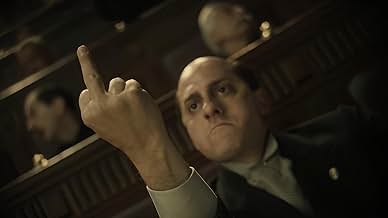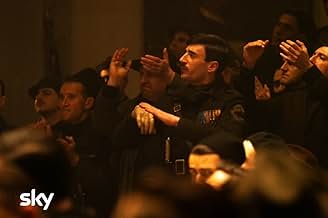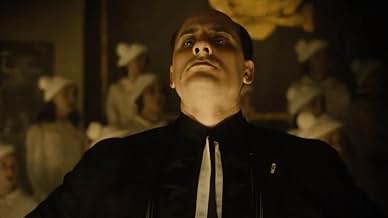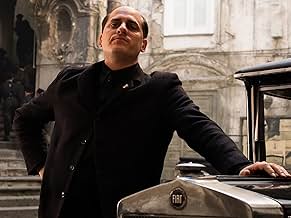Benito Mussolini's early career from his founding of the Fasci Italiani in 1919 up to the assassination of socialist politician Giacomo Matteotti in 1924 and his speech in Parliament on 3 Ja... Read allBenito Mussolini's early career from his founding of the Fasci Italiani in 1919 up to the assassination of socialist politician Giacomo Matteotti in 1924 and his speech in Parliament on 3 January 1925.Benito Mussolini's early career from his founding of the Fasci Italiani in 1919 up to the assassination of socialist politician Giacomo Matteotti in 1924 and his speech in Parliament on 3 January 1925.
- Awards
- 2 wins total
Browse episodes
Featured reviews
A solid recommendation from me. I really enjoyed the flow, acting, action, and storytelling. I always find it fascinating how such a destructive force can rise to power-what forces support it, oppose it, and which ones get swayed, and why. The quality of the series is excellent. For me, it belongs in the same league as Der Untergang and Unsere Mütter, unsere Väter.
What makes this series particularly compelling is its exploration of the political landscape in Italy at the time. The power struggles between the socialists, the monarchy, and other factions add layers of intrigue, showing how different forces either resisted or enabled the rise of authoritarianism. The shifting allegiances and moral dilemmas make for gripping storytelling.
On top of that, the action sequences are intense and well-executed. The battles, street clashes, and political confrontations feel raw and realistic, adding weight to the historical events. The choreography, cinematography, and pacing of these scenes keep the tension high, making it a visually and emotionally engaging experience.
What makes this series particularly compelling is its exploration of the political landscape in Italy at the time. The power struggles between the socialists, the monarchy, and other factions add layers of intrigue, showing how different forces either resisted or enabled the rise of authoritarianism. The shifting allegiances and moral dilemmas make for gripping storytelling.
On top of that, the action sequences are intense and well-executed. The battles, street clashes, and political confrontations feel raw and realistic, adding weight to the historical events. The choreography, cinematography, and pacing of these scenes keep the tension high, making it a visually and emotionally engaging experience.
I mainly focus on the film aspects. Without getting too deep into it, I try to gauge how much truth versus mystification is presented. I don't align with either the right or the left.
This series is one of the most beautiful I have seen in recent times. Mussolini's dialogue with the camera is pure gold. The way he conveys his thoughts, mocks the viewer, and shares his confessions keeps you glued to the screen and makes you feel involved in the story. Marinelli is fantastic! Those who criticize him likely do so for reasons unrelated to his performance. Francesco Russo is superb, and Barbara Chichiarelli is perfect!
This series is one of the most beautiful I have seen in recent times. Mussolini's dialogue with the camera is pure gold. The way he conveys his thoughts, mocks the viewer, and shares his confessions keeps you glued to the screen and makes you feel involved in the story. Marinelli is fantastic! Those who criticize him likely do so for reasons unrelated to his performance. Francesco Russo is superb, and Barbara Chichiarelli is perfect!
The film presents the beginnings of Benito Musollini's political career. But to a greater extent it is a study of the creation of a dictatorship. And this is a universal and timeless phenomenon.
What is unusual is the form, which may put off some viewers. The main character often speaks directly to the audience, presents his thoughts and comments on the events taking place, sometimes these allusions are current, e.g. In episode four when he says the slogan MIGA (you will understand when you see it). It is a really great scene.
The film is also quite baroque, at times surreal.
The acting makes a great impression. Luca Marinelli (Musollini) behaves on screen like his prototype. If you know the history and have seen Mussolini's grotesque speeches, you can imagine that this required great skills. Other roles, although episodic, are also worth attention. For example, Benedetta Cimatti is great as the suppressed wife of the Duce.
Due to the specific form of the film, some viewers may be put off by it.
But it's a very good movie.
What is unusual is the form, which may put off some viewers. The main character often speaks directly to the audience, presents his thoughts and comments on the events taking place, sometimes these allusions are current, e.g. In episode four when he says the slogan MIGA (you will understand when you see it). It is a really great scene.
The film is also quite baroque, at times surreal.
The acting makes a great impression. Luca Marinelli (Musollini) behaves on screen like his prototype. If you know the history and have seen Mussolini's grotesque speeches, you can imagine that this required great skills. Other roles, although episodic, are also worth attention. For example, Benedetta Cimatti is great as the suppressed wife of the Duce.
Due to the specific form of the film, some viewers may be put off by it.
But it's a very good movie.
The english subtitles are a disaster. They look like automated translations not reviewed by someone who understand italian. For example "Margarita" (the name of a woman) is translated as "margarita pizza". Or "No, no" is translated "ninth", because in italian "nono" means "ninth".
Sometimes these bugs don't help comprehension. They mix up pronouns: "They kick it out" instead of "They kick him out". They don't take into account the formal you that in italian is she. For some complex sentences there is no analysis done by a human : "his husband".
An amateur job done by incompetents.
Such a magnificent work deserves better.
Sometimes these bugs don't help comprehension. They mix up pronouns: "They kick it out" instead of "They kick him out". They don't take into account the formal you that in italian is she. For some complex sentences there is no analysis done by a human : "his husband".
An amateur job done by incompetents.
Such a magnificent work deserves better.
The header here is not my line but taken from when Mussolini sometimes bursts through the fourth wall and comments to the viewer. This was a superb attempt at capturing the rise of a chaotic man during one of the most chaotic periods of history.
Mussolini was flawed, selfish, vindictive and thuggish - and so very full of contradictions.
What this series perfectly captures is the influence of Margherita Sarfatti, his lover and his principal advisor. She coins the best line to describe his motivation and that of fascism 'Take what you want by any means.' This is both chilling and a warning from history... One reviewer here talks about how far fetched the story becomes - A Samurai ? Yes he featured in real life. He influenced Italian poets to introduce Haiku! However bizarre the story seems to be, much of what you see is really not that far fetched.
Mussolini was flawed, selfish, vindictive and thuggish - and so very full of contradictions.
What this series perfectly captures is the influence of Margherita Sarfatti, his lover and his principal advisor. She coins the best line to describe his motivation and that of fascism 'Take what you want by any means.' This is both chilling and a warning from history... One reviewer here talks about how far fetched the story becomes - A Samurai ? Yes he featured in real life. He influenced Italian poets to introduce Haiku! However bizarre the story seems to be, much of what you see is really not that far fetched.
Did you know
- TriviaWhen Joe Wright got on board as director, at first he meant to have the actors say their lines in English. Then he changed his mind and chose to shoot the series in Italian, for a higher immediacy.
- How many seasons does Mussolini: Son of the Century have?Powered by Alexa
Details
- Release date
- Countries of origin
- Official site
- Language
- Also known as
- Mussolini: Son of the Century
- Filming locations
- Production companies
- See more company credits at IMDbPro
- Runtime52 minutes
- Color
Contribute to this page
Suggest an edit or add missing content

Top Gap
By what name was M - L'Enfant du siècle (2024) officially released in India in English?
Answer
![Watch Trailer Season 1 [OV]](https://m.media-amazon.com/images/M/MV5BYWM4MjYyMDktOWQwNy00NzNlLTg0OGUtZjk5Yzk0MjA2YmNlXkEyXkFqcGdeQXRyYW5zY29kZS13b3JrZmxvdw@@._V1_QL75_UX500_CR0)


























